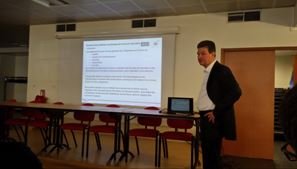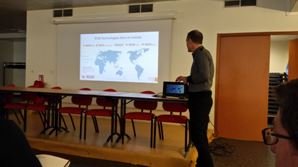Furnace technology: responses to changing specifications - March 27, 2015 in Chambéry
Dassault : Equipment , point of view of an integrated caterer of the aeronautical sector.
Christian Bondil (DASSAULT EQUIPEMENTS)
Presentation not available for confidentiality reasons.
Dassault Aviation is an aircraft manufacturer, which designs, produces and supports aircraft. (Rafale, Mirage, Neuron, Falcon)
The Falcon in the business market, would represent 50% of the American market.
-
Dassault Equipment's core business is the production of flight controls, a critical piece of equipment for aircraft safety and therefore strategic for the company.
Dassault Equipment maintains a heat and surface treatment workshop, with the objective of maintaining a high level of quality, reducing costs, and being more environmentally friendly.
Small "compact" workshop with limited space, has a small number of furnaces.
Over the last 15 years, the "old" heat treatment furnaces (salt baths, furnaces in a carburizing atmosphere and gas nitriding) have been replaced by modern multi-purpose vacuum furnaces, allowing automatic cycles to be run.
This is done with the objective of continuous and controlled evolution
strategic skills maintained in-house and new ones integrated
permanent concern to improve the process by reducing the risks and the environmental impact.
Example of gas nitriding :
Existing installation was a pot furnace from the 70s creating environmental problems.
This furnace was replaced by an automatic vacuum furnace, equipped with a supervision, a probe allowing the atmosphere control, with measurement of the dissociation rate, and calculation of the nitriding potential (Kn).
This installation allows the traceability of all the parameters of the treatment and the oven.
Result: Cycle time reduced by 25%.
Number of operations to perform this heat treatment reduced from 33 to 12
Minimum value of Kn regulated 0,3
Better controlled microstructure result
Dispersions in terms of limited depth
Dassault does not recognize Nadcap as a quality management system, because most of the processed parts are "defense confidential".
Evolution of nitriding furnace control systems.
Philippe Ségovia (ALD FRANCE)
Kn control and probe monitoring
ALD is a French manufacturer of vacuum and nitriding furnaces. Owner of a patent for the construction of ionic nitriding furnaces, plasma with active screens.
-
Mr. Segovia focused his presentation on the different points of the Nadcap standard, which must be met during the nitriding or nitrocarburizing cycle.
AMS 2750 E for pyrometry
AMS 2759/6 B for nitriding of high alloy steels
1987 version: control of the combination layer.
classe 1 < = 13 micron
classe 2 <= 25 micron
Version 1999 Regulation Kn = pNH3 / P3/2H2
AMS 2759/12 nitrocarburizing with potential control Kn Kc
Since 2007 % of porosity allowed on the nitrocarbon combination layer
To ensure the best control of a nitriding cycle, it is recommended to implement:
An ABB AO2020 atmosphere analyzer measures partial pressure and calculates the dissociation rate. This atmosphere measurement requires heating the line to +65°C
And a Datanit SCR probe, or the H2 Smart United probe, O2 probe (zirconia) Stangue ref solid probe measures in an oven at 750° measures pot O2 even at room temperature).
This equipment allows:
Repeatability of the regulation
Cycle time reduction
Reduction of gas consumption
Compliance with metallurgical requirements.
Low-pressure carburizing: processes and furnaces for an ever-increasing variety of applications.
Lionel Nicollet (ECM TECHNOLOGIES)
ECM - 1000 cells, for 200 lines.
ECM has developed a low-pressure sintering plant for optimizing the vacuum sintering and carburizing process.
In cooperation with Höganäs, 300,000 tons of alloy powder per year.
Annual production of sintered parts 850 000 tons.
-
This "vacuum" installation allows the different operations of the thermal sintering cycle to be carried out in the same installation:
"Unbinding 650°C
Sintering 1200 1300°C under controlled atmosphere N2 H2. High temperature sintering allows to densify the sintered parts.
Cementing 950°C + quenching up to 20 bars, allows to limit the deformations, possible carbo injection NH3.
Economic analysis
Time saving
Limited floor space
Lower annual maintenance costs
Positive energy balance
Limited deformation.
Possible extension of production. Possibility thanks to the multi-chamber to specialize the chambers to the different stages of the process.
Gas cementation: almost no consumption of process gas, dream or reality?
Pascal Riondy (IPSEN)
Hybridcarb is a revolutionary system that allows to work "in closed loop" on batch furnaces in endothermic atmosphere, replacing or supporting endothermic or nitrogen methanol generators.
-
Une atmosphère de traitement thermique traditionnelle est une source importante de consommation de gaz pendant toute la durée du cycle, dont le « rendement » est très faible < à 2%.
The first attempts to regenerate a heat treatment atmosphere were made in 1991 by the gas supplier Linde.
- Mini endothermic generator + atmosphere regeneration system.
- 30 systems in operation
- The atmosphere regeneration is active during the stable phases (case hardening stage)
- Space saving h 1400 width 1300 depth 900 350 kg
- Energy saving of about 80% compared to an endothermic gas supply.
- CO2 emission reduction of 60 to 90%.
- Savings of 10 to 50 k€ per year in operation.




